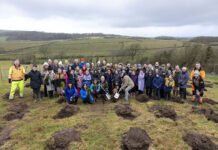
THERE was a 9% decrease in all sector housebuilding starts and a 7% reduction in completions between 2023 and 2024, the Scottish Government’s quarterly housing statistics have revealed.
In the 12 months ending December 2024, there were 19,797 homes built and 15,050 new builds started. All sector completions (-7%) and starts (-9%) were lower than the previous 12 months.
The private sector built 15,066 homes and the social sector built 4,731 homes. In terms of starts, building work on 11,617 was started by the private sector and 3,433 homes by the social sector.
Excluding 2020 (where Covid-19 impacted housebuilding) private sector led completions were the lowest since the year to end of December 2017 and starts the lowest since the year to end of December 2013. In the social sector, completions were the lowest since the year to the end of December 2017 and starts were slightly higher than the previous year.
In terms of the affordable housing supply programme, in the year to the end of December 2024, there were 6,440 approvals, 6,501 starts, and 8,180 completions of affordable homes. The number of completions were down by 18% (-1,736 homes) compared to the year to end December 2023. However, approvals and starts increased by 4% (249 homes) and 4% (254 homes) between 2023 and 2024 (year ending December).
The statistics are used to inform progress against Scottish Government affordable housing delivery target to deliver 110,000 affordable homes by 2032, of which at least 70% will be for social rent and 10% will be in rural and island communities. By December 2024, 26,039 affordable homes have been completed towards the target. The completions consist of 19,945 (77%) homes for social rent, 3,644 (14%) for affordable rent, and 2,450 (9%) for affordable home ownership.
Commenting on the latest quarterly housing statistics publication, Scottish Government housing minister Paul McLennan said, “We have a strong track record in delivering affordable housing in Scotland with these latest statistics showing that from 2007 to the end of December 2024 more than 136,000 affordable homes have been delivered, with 97,000 of those for social rent. Up to March 2024, that is 47% more affordable homes per head of population than England and 73% more than Wales.
“It is encouraging that affordable housing starts and approvals have increased in the last year to date, and we will continue to work with partners to increase these levels even further through our £768 million investment in 2025-26, which is an increase of £200 million when compared to this financial year.
“Building on the success of the Scottish Empty Homes Partnership that has helped almost 11,000 empty properties become homes since 2010, next year we will also invest £2 million into bringing more privately owned empty homes back into use.
“We are also focused on working with partner organisations, through our Housing Planning Hub, to identify how our planning system can help to provide solutions. This decisive and properly targeted action, based on evidence, will provide more homes and better places for people to live in.”
Jane Wood, chief executive of Homes for Scotland (HFS), commented, “It will soon be a year since the Scottish Parliament declared a national housing emergency. Starts and completions are the clearest form of data for tracking the effectiveness of the political response to this.
“With these now falling for the third year in a row, there is nothing to assure either our members or the 693,000 Scottish households living in some form of housing need, that the situation is being tackled with the necessary resource and level of urgency that is so clearly warranted.
“Every year that new housing starts and completions continue to decline simply adds to the length of time it will take for Scotland to address the shortfall of over 100,000 homes that has now accumulated since 2008.
“Whilst we recognise the progress that the Scottish Government has made – its work with us on identifying stalled sites for example – this is not having the immediate impact that is required. We again emphasise the need for emergency action: action on the regulatory burden, action on planning and action on Affordable Housing. For instance, we are four months on from the announcement of a Housing Planning Hub but yet to see any tangible detail or outcomes. Affordable Housing budgets have been restored but we don’t know which projects will have the necessary funding to proceed.
“And with homelessness having reached another record high, comparisons regarding housing delivery elsewhere in the UK are not always helpful and do not reflect the ambition for housing that we believe Scotland deserves.
“Given the strong interdependencies between private and social housing delivery, it should be a wake-up call to all that private sector starts have reached their lowest level since 2013. Until we get to grips with the issues of a failing land supply and a heavy regulatory burden it is doubtful we will see any immediate cessation in the housing emergency.
“As ever, HFS and its members stand ready to play their part in increasing the supply of high-quality, energy efficient and affordable homes across all tenures to tackle the housing emergency and provide their crucial expertise on how Scotland’s regulatory framework can deliver rather than block the new homes so desperately needed by Scotland’s people.”








